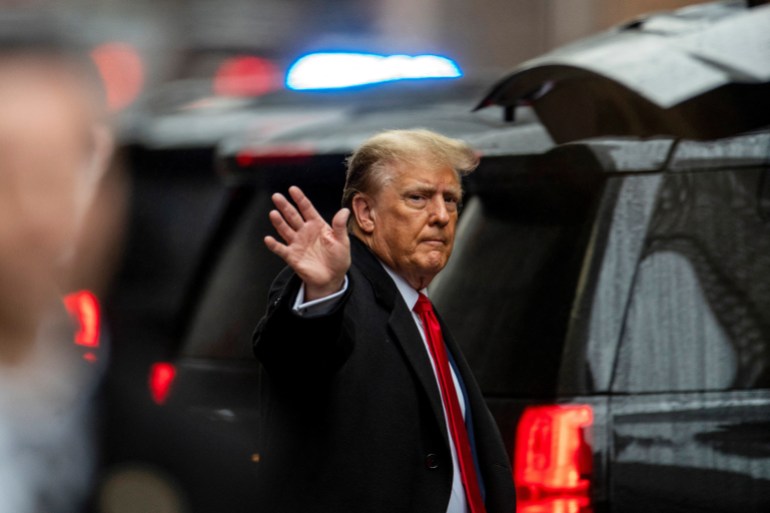The US Supreme Court on Thursday began hearings about Donald Trump’s eligibility for the presidency in a historic case that could either boost the former president’s reelection campaign or see him kicked off the list of candidates for the upcoming November elections.
Filed by voters opposing Trump, the case will see justices decide whether a Colorado court was right to rule that Trump violated an article of the 14th Amendment to the US Constitution during the 2020 elections saga, and whether that violation means he can be barred from running for office. It is part of a swath of legal challenges Trump is facing ahead of the elections, including four criminal indictments.
Here are the key things you need to know about Thursday’s proceedings.
What does the case allege Trump did?
Section 3 of the 14th Amendment bars people who have “engaged in insurrection or rebellion” against the state from holding federal office. Trump’s challengers argue that his role in the January 6, 2021 attack on Congress means he should be barred from seeking office.
So far, two US states – Colorado and Maine – have invoked the clause and declared Trump ineligible to run in their territories, even as primaries heat up, with Trump leading the Republican race to the White House.
Who brought the case and how did it reach the Supreme Court?
A group of Colorado voters filed the lawsuit in August 2023. While a Colorado district court denied their attempt to bar Trump from the election, the Colorado Supreme Court, on appeal, decided in December that Trump had indeed violated Section 3 of the Amendment – the first ruling of its kind. Electoral officers in Maine also made a similar ruling.
Trump’s team appealed to the US Supreme Court in Washington, DC following Colorado’s decision. The Colorado Supreme Court, and the state of Maine, have stayed their rulings until the Supreme Court decides on the case.
The court’s decision could have nationwide implications, meaning if the Colorado Supreme Court decision is upheld, Trump could be removed from the ballot in other states as well.
What was Trump’s defence?
In a written argument to the court, Trump’s team argued that the insurrection clause could not be invoked if Congress had not enacted a specific law around it.
The team referred to a very old precedent, the Griffin case, to support this argument. In the 1869 case, Chief Justice Salmon Chase of California ruled that the insurrection ban was not “self-executing”, and could not be enforced without Congress acting on it first.
Conservative Justice Brett Kavanaugh placed particular emphasis on that case in his exchange with Trump’s opposers, pointing out how close to the enactment of the Amendment the case was.
“It’s by the chief justice of the United States a year after the 14th Amendment,” Kavanaugh said, referring to Justice Chase. “That seems to me highly probative of what the meaning or understanding of that otherwise elusive language is.”
Jonathan Mitchell, Trump’s attorney, also argued in court that Trump did not have a deliberate plan to overthrow the government, adding that an insurrection needed an “organised, concerted effort”. Mitchell said the march on the US Capitol on January 6 was a “riot”.

What did the Supreme Court justices say?
Supreme Court justices, both liberal and conservative, hit lawyers representing Trump’s challengers with questions that seemed to suggest the court may back Trump in a ruling. The arguments did not focus on whether Trump had violated the insurrection clause, but rather on narrower provisions, like who the clause was meant for.
Led by Chief Justice John Roberts, the justices questioned if the clause banning insurrection was meant to apply to former US presidents and if the article could be invoked without US Congress first passing a law on it.
The justices also questioned if courts striking off candidates would affect voters’ rights and, therefore, US democracy itself. If Trump is struck off the ballot in Colorado, they said, it would set a precedent and could see other states strike off presidential candidates in future elections, allowing the choice of who becomes president to come down to a “handful of states”.
The Supreme Court is tackling whether the Colorado court’s decision was correct, but a definitive ruling against Trump would open the door for other states to bar Trump from the ballot. The decision would be a binding precedent in states where the law requires that candidates on the ballot must be eligible for the post they’re running for, according to some experts.
“Your position has the effect of disenfranchising voters to a significant degree,” Brett Kavanaugh, a conservative justice, told the attorneys. “What about the background principle – if you agree – of democracy?”
Justice Elena Kagan, a liberal, questioned the power of states in deciding candidates for nationwide elections.
“Why should a single state have the ability to make this determination not only for their own citizens, but for the rest of the nation?” Kagan asked.
What happens next?
It usually takes the Supreme Court a few months to issue rulings, however, the court is expected to expedite a decision in this case. Experts say an opinion is likely in a matter of weeks – before Super Tuesday on March 5, the day when most states will hold primaries, including Maine, Colorado and 13 others.
Speaking to reporters after the hearing, Trump said it was “a beautiful thing to watch in many respects”, but complained about the case being brought at all.
Trump is on track to clinch the Republican ticket, whether or not he is on the ballot in these two states, and despite facing a slew of legal challenges in the lead-up to the elections.
Experts say Trump has used appearances at the court cases to rile up his supporters and build momentum for his campaign ahead of the November 5 vote.
#Trump #Colorado #Supreme #Court #stop #running #office #News



